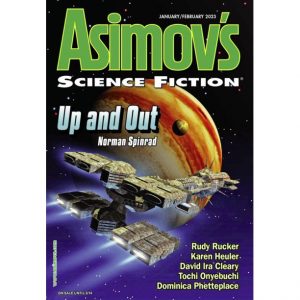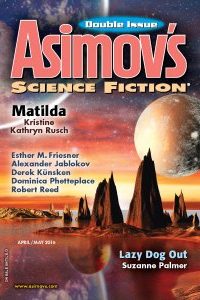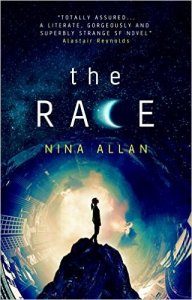Karen Burnham Reviews Short Fiction: Asimov’s, Clarkesworld and The Sunday Morning Transport
 Asimov’s 1-2/23
Asimov’s 1-2/23
Clarkesworld 2/23
The Sunday Morning Transport 1/22/23, 2/5/23, 2/12/23
Asimov’s presents us with an interesting range of stories to start the year, with two that are optimistic about the future but in very different ways. The cover novella is “Up and Out” by Norman Spinrad, a key voice of New Wave science fiction. In this (possibly overlong) story we follow “Elon Tesla,” a man who singlehandedly enables the terraforming of Mars, exploration of the outer solar system, and possibly interstellar travel as well. We’re introduced to him as he’s in between long periods of hibernation, allowing him to effectively time-travel into the future to see the results of his efforts. He reflects on his whole life up to this point, bootstrapping his parents’ Earth-Moon shuttle company into a lucrative Earth-Mars-Asteroid Belt concern, the one great love and lover of his life, his prescient investments in key technologies, etc. It’s a Great Man vision of the future, ala D. D. Harriman of Robert Heinlein’s “The Man Who Sold the Moon” (1950). Compare this to “Woman of the River” by Genevieve Williams, an example of today’s Hopepunk subgenre. This story also spans a life (although the transitions in time could have been demarcated more clearly). Set in the near-ish future on the Duwamish river in the Pacific Northwest, Iris is a settler descendant who is part of a gathering of settler and indigenous peoples to determine the fate of the river. The project under discussion is whether to embark on a project to once again unite two rivers that were separated in the industrial era, restoring the river ecosystem. The climax of the story is a community meeting in which both the pros and cons of the proposed plan are raised and debated. While the author clearly has their thumb on the scales, given which side Iris supports, people are treated respectfully, and the sweeping timespan gives us a chance to see the consequences of the decision. It’s an approach that foregrounds communal decision-making in the spirit of getting to a point where we can live with our shattered world and each other. Less grandiose than the vision of “Up and Out”, but more democratic.
There’s a democratic element as well to one of the more amusing stories in the issue, the novelette “The Less than Divine Invasion” by Peter Wood. We follow Lance Smith, an alien warrior stranded on Earth (specifically Kinston, North Carolina) after his AI mothership gets sick of them and abandons all their scouting parties. He starts selling hamburgers and doesn’t care a fig for social niceties – he’d really prefer to vaporize everyone. After some comedy involving the movie theater that his alien superiors buy, Lance’s human girlfriend encourages him to get involved in the town’s civic life – first as part of a group of business owners looking to revitalize downtown, and eventually as Mayor. It’s a bit of a cliché where the outsider who doesn’t care enough to lie manages to attract majority support and win elections, but thisis solidly done. The issue also ends entertainingly with the novella “My Years as a Boy” by David Ira Cleary. It’s in the style of P. G. Wodehouse’s Jeeves and Wooster, with rich young Taggart on an airship accompanied by his android valet Reggie. The cast includes sexy twins from New Zealand; two macho lunks; a female smuggler; and Bicksworth, one of Taggart’s school chums. Gender-bending and hijinks ensue and Reggie, of course, has to save Taggart from his own lack of any kind of self-preservation mechanism. It’s fun all around.
Clarkesworld in February is full of beautiful and interesting stories, of which my favorite was the novelette “An Ode to Stardust” by R.P. Sand. Tara Jacksingh is the super overachieving young station commander who has also been struggling all her life with undiagnosed chronic pain. The Esslugai work in mines that produce the ores that power spaceships. They’re generally content to do so, and Tara becomes friends with Bikbik, granddaughter of the Esslugai matriarch. This friendship is expanding for both of them and allows Tara to start to come out of herself. The narrative of Tara’s personal journey through her chronic condition and the larger colonial narrative of exploitation are nicely woven together, highlighting the intersectionality. It’s a story that invites reflection, and leaves one wondering what the Esslugai perspective on the whole tale would have been.
A story that centers the experience of beings much different from ourselves is “Larva Pupa Imago” by Eric Schwitzgebel. It’s set in a far future where nanobots of some kind have wiped out humans, but birds and butterflies and other beings have incorporated them and evolved. We follow Bo, a butterfly, through his whole life. He’s one of the larva selected to mature, and as a male his main role is to eventually mate. He’s given some education, but as a pupa he is mostly super close with his brother Lem, exchanging lots of cognitive fluid (which contains thoughts, memories, erotica, etc.) with him. He becomes Bolem after a tragedy befalls Lem. Eventually Bolem becomes an adult imago and we follow him on his journey to find a mate, completing his life cycle. It’s one of those stories that is relatable even when describing a wholly alien consciousness.
Elsewhere in the issue, “Somewhere, It’s About to Be Spring” by Samantha Murray is a rather lovely story of a crippled starship. Lacuna has lost her crew. They had been exploring a rare rogue planet when they were hit with small asteroid debris. Over unthinkable stretches of time, Lacuna starts to notice changes within herself, as various systems and bots come back online and start to communicate again. Over millennia, they create a new life for themselves. “Silo, Sweet Silo” by James Castles has a Cold War feel but is still sadly plausible. TK-115 is the narrator, a smart ICBM that wasn’t able to launch when nuclear armageddon was finally declared. It allows some human survivors into its silo on the condition that they will hit the launch button it can’t activate itself – it’s fixed itself and deeply wants to fulfill its destructive destiny. The humans convince it to stay, concerned about its death wish for a host of reasonable reasons, but the temptation remains. Will it have a chance to end gloriously? “Introduction to 2181 Overture, Second Edition” by Gu Shi (translated by Emily Jin) is a very interesting look at the ramifications of widely available cryosleep technology. It discusses potential business opportunities, legal implications, and the effects on families whose members make different choices. Written in the form of an introduction to a non-fiction book, that perspective allows for a mix of infodumping, dispassionate conjecture, and personal involvement – a fantastic choice for the way the author tackles the topic.
The Sunday Morning Transport continues to deliver top-notch short fiction via newsletter. I found “The Ethnomusicology of the Last Dreadnought” by Yoon Ha Lee to be particularly striking (as so much of Lee’s fiction is). The idea of preserving a dreadnought battleship and its unique musical properties slowly morphs into a desire to reconstruct its past armed glory – which of course has immense implications. It’s an on-point demonstration of how perfectly “neutral”-sounding projects can wind up going in disturbing directions. “The Work-Clock” by Benjamin C. Kinney features Zek, an apprentice inspector at the Templar edifice that imprisons the Destroyer. He’s proud of his job, but when he gives the anchoress at the center of the complex some time-saving tips, and she accidentally breaks the mechanism, all Hell might break loose. They band together as the Templars mount an armed response to try to restore the system that was also, conveniently, powering their factory. Zek slowly comes to realize that the Anchoress may be more than what he assumed, and the story comes to a satisfying conclusion. MarissaLingen has a strangely sweet story in “Exiled to Gravity”. Alma’s mother tended to scam wealthy men, and part of her spiel was that Alma had an “allergy” to artificial gravity that required them to leave their (implied to be glamorous) life in space and stay on Earth. As Alma grows up, she rejects everything about her mother, getting a degree she hopes to put to use as a space station engineer. She assumes that the allergy is as fake as everything else about her mother, but when she gets out to her dream job past the asteroid belt, things don’t go well. Of course, the doctors think it’s all in her head – she does as well for a long time. It takes her a while and an understanding partner to sort out all her feelings about what she wants and what she assumed and what she can do with her life. It’s the character portrait of someone who deserves a happy ending.
Recommended Stories
“The Ethnomusicology of the Last Dreadnought,” Yoon Ha Lee (The Sunday Morning Transport 2/5/23)
“The Work-Clock,” Benjamin C. Kinney (The Sunday Morning Transport 1/22/23)
“Exiled to Gravity,” Marissa Lingen (The Sunday Morning Transport 2/12/23)
“Somewhere, It’s About to Be Spring,” Samantha Murray (Clarkesworld 2/23)
“An Ode to Stardust,” R.P. Sand (Clarkesworld 2/23)
“Larva Pupa Imago,” Eric Schwitzgebel (Clarkesworld 2/23)
“Woman of the River,” Genevieve Williams (Asimov’s 1-2/23)
Karen Burnham is an electromagnetics engineer by way of vocation, and a book reviewer/critic by way of avocation. She has worked on NASA projects including the Dream Chaser spacecraft and currently works in the automotive industry in Michigan. She has reviewed for venues such as Locus Magazine, NYRSF, Strange Horizons, SFSignal.com, and Cascadia Subduction Zone. She has produced podcasts for Locusmag.com and SFSignal.com, especially SF Crossing the Gulf with Karen Lord. Her book on Greg Egan came out from University of Illinois Press in 2014, and she has twice been nominated in the Best Non-Fiction category of the British SF Awards.
This review and more like it in the April 2023 issue of Locus.
 While you are here, please take a moment to support Locus with a one-time or recurring donation. We rely on reader donations to keep the magazine and site going, and would like to keep the site paywall free, but WE NEED YOUR FINANCIAL SUPPORT to continue quality coverage of the science fiction and fantasy field.
While you are here, please take a moment to support Locus with a one-time or recurring donation. We rely on reader donations to keep the magazine and site going, and would like to keep the site paywall free, but WE NEED YOUR FINANCIAL SUPPORT to continue quality coverage of the science fiction and fantasy field.
©Locus Magazine. Copyrighted material may not be republished without permission of LSFF.







